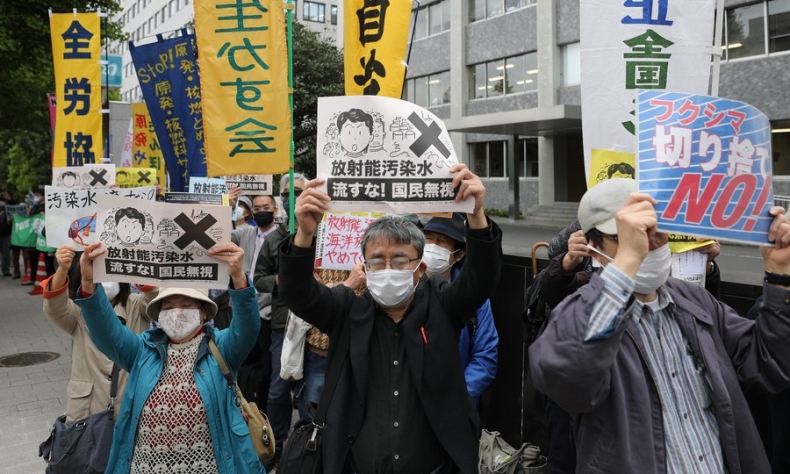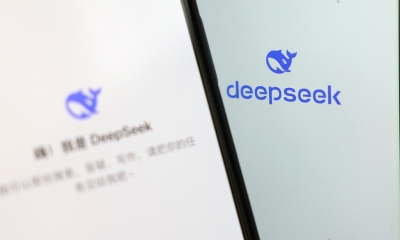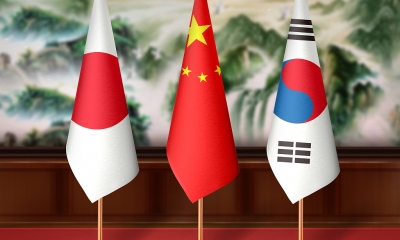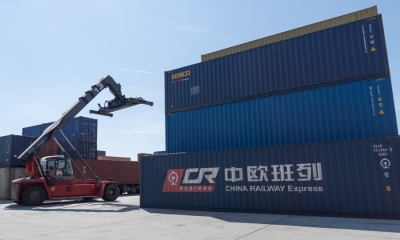The West’s Attitude to Japan’s Nuclear Water Dumping Plan Shows Double-Standard

Discharging millions of gallons of ‘treated’ water into the world’s largest and deepest body of water is perfectly acceptable in the West because Japan is an ally.
The Japanese government made a curious and almost certainly unwise decision last week. It announced that waste water from the doomed Fukushima nuclear power plant will be released into the Pacific Ocean.
The government claimed that the water will be treated before being discharged and that all radioactive material will be eliminated. The government also said it will take decades to fully dump all the water. Unless there is a change in plans, the disposal into the Pacific Ocean begins in two years.
These claims came under immediate scrutiny, with Beijing among the most vocal skeptics. But that was not the case in other important places across the globe.
Unfortunately, Japan’s decision faced little public opposition in Washington and most other Western capitals, a reaction that was stunning considering the West has steadfastly maintained that the environment – air, ground and water – is a precious resource that must be carefully maintained so that future generations may safely enjoy it. Remember, too, that John Kerry, America’s climate envoy, arrived in China shortly after Japan’s announcement and promised to…hold China’s feet to the fire on all things environment. We also should not forget the Biden administration has called leaders from multiple nations to join it later this month for a climate virtual conference that coincides with Earth Day on April 22.
The mixed messages emanating from Washington leave us all confused.
Hypocrisy indeed screams loudly as any examination of the West’s response to the Japanese plan is considered. Imagine for a moment if Chinese leader had publicly stated his country’s intent to litter the Pacific Ocean with millions of gallons of waste water but promising first to do everything possible to make that water safe before releasing it.
The international outrage would still be heard. The word “sanctions” would be discussed in every Western capital. These Western leaders also would be banging on the doors of the offices of the International Olympic Committee and demanding next winter’s Olympic Games be removed from Beijing. And the compliant for-profit media in these countries would be in full voice asserting that China was demonstrating an attitude of a bully.
But because it is Tokyo, not Beijing, planning to dump “treated” water into the Pacific Ocean, no one in the West is discussing sanctions, pulling the Olympics out of Japan or questioning the integrity of the plan.
When we acknowledge just how quick the West is to criticize China for its supposed environmental failings, the acceptance of Japan’s “we have nothing to worry about” line is all too cavalier. It is yet another example of Western media accepting at face value the claims of supposedly credible authorities.
The Washington Post played up the Biden administration’s support for the Japanese decision, which one molecular pathologist at a London university also said was sensible. In fairness to the newspaper, in a separate story it did quote a top Chinese official challenging his Japanese counterpart to drink the water if he was absolutely convinced it was safe. Criticisms throughout Asia were acknowledged in many stories, but those voices appeared in media discourse simply to demonstrate both sides of the story were addressed. No offense to Japanese fishermen, but they did not hold the same sway as molecular scientists.
United Nations human rights experts apparently do not matter either. Three of them asked legitimate questions about the Japanese plan. According to Japanese officials, tritium levels are very low and do not pose a threat to human health. Tritium is one radioactive element that cannot be removed in the treatment process, and that partially explains why the U.N. human rights experts are worried. They suggest tritium can bind to other molecules, ensuring that it will move up the food chain and eventually be consumed by humans. They also state tritium could pose risks to humans and the environment for over a hundred years.
No, I did not gather that information from the U.N. experts from a major U.S. news agency; I had to find it on the United Nations’ website.
Forbes.com offered this happy headline to its analysis of Tokyo’s decision: “Japan Will Release Radioactive Fukushima Water Into The Ocean, And Why That’s O.K.”
Reporting on Tokyo’s decision abruptly slowed down in the United States, which awaits a verdict in the murder trial of a former Minneapolis police officer charged in George Floyd’s death. In addition, robust coverage followed the Biden administration’s decision to impose sanctions on multiple Russian officials in the aftermath of a cyber-attack blamed on the Kremlin. And the potential for another sex scandal involving a prominent politician simply has to be covered every single day.
There is only one conclusion that can be drawn: Discharging millions of gallons of “treated” water into the world’s largest and deepest body of water is perfectly acceptable in the West because Japan is an ally.
 Facebook
Facebook
 Twitter
Twitter
 Linkedin
Linkedin
 Google +
Google +







